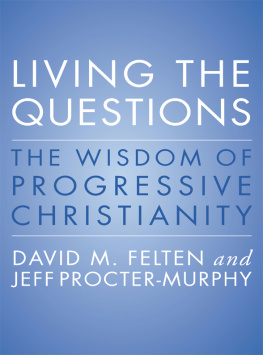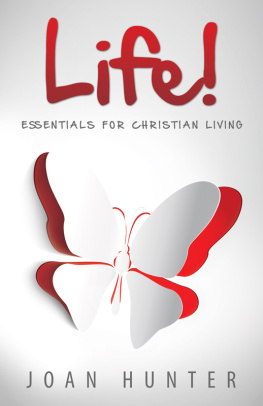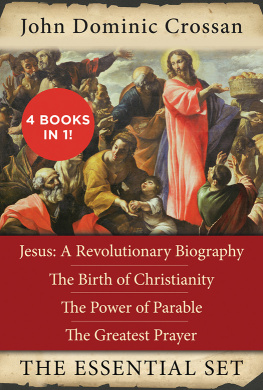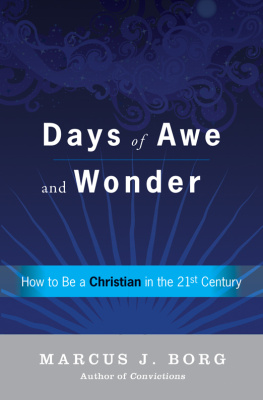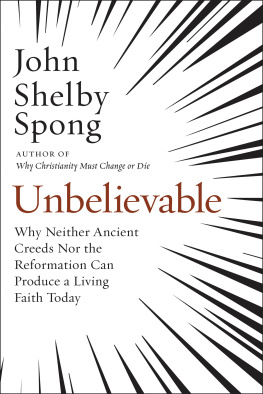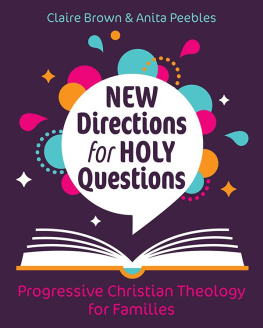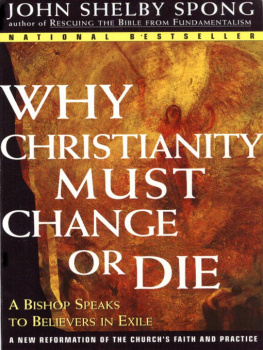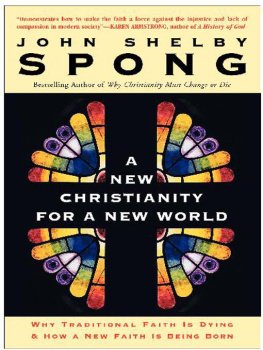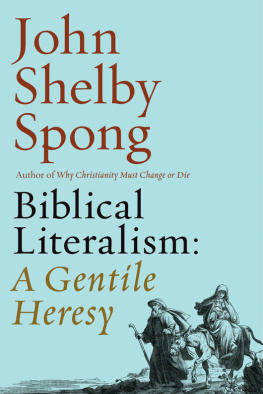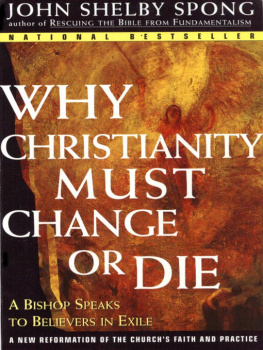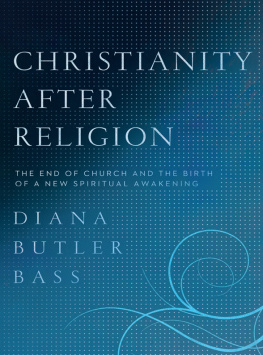Living
the
Questions
THE WISDOM OF PROGRESSIVE CHRISTIANITY
David M. Felten and Jeff Procter-Murphy

To Nathaniel, Mattie, and Samuel, Rachel and Claire, for the gift of being your dads.
The beginning of true wisdom is asking the questions for which there are no answers.
Harrell Beck
CONTENTS
6 A Passion for Christ:
Paul the Apostle
7 Out into the World:
Challenges Facing Progressive Christians
16 Social Justice:
Realizing Gods Vision
17 Incarnation:
Divinely Human
18 Prayer:
Intimacy with the Divine
19 Compassion:
The Heart of Jesuss Ministry
A religion is as much a progressive unlearning of false ideas concerning God as it is the learning of the true ideas concerning God.
Rabbi Mordecai Kaplan, founder of the Reconstructionist movement of Judaism
I t was early in the fall and the group settled in for its first session of the Bible study. In introducing the Genesis material for discussion, the facilitator referred to Adam and Eve as metaphors and not historic individuals. The participants reactions were swiftand representative of what might occur in many churches. There was anger: How dare you question the Bible? I just knew you were one of those damned liberals who dismantle everything to suit your political agenda! There was panic: Why are you trying to destroy my faith? What else do I believe that isnt true? There was confusion: You mean there are two Creation stories in Genesis? How come Ive never seen this before? What else have I missed? And there were tears.
But there was also relief. There were some who looked at the facilitator as though she had opened a door theyd been peeking through for years. One participant said, Thank you, thank you, thank you. Ive known in my heart there was more to these stories, that reading them as a literal account didnt make sense. But I never said anything because I was afraid it would make me a heretic.
And these are the people who were interested enough to commit to a Bible study! A lot of people just dont care anymore. They stopped going to church long ago because nothing they heard or experienced resonated with them. Despite claims by church-growth gurus, the fields are not ripe for harvest. Far from it. As one Christian pollster noted, the large numbers of people not involved in faith communities are not just waiting to be invited to church. They are passionately disinterested in the church.
The graying and abandonment of so-called old-line churches is but one symptom of this disinterest and dissatisfaction with the way churches do religion. Many speak of being spiritual rather than religious, honest rather than hypocritical. Evangelical and fundamentalist leaders attribute the atrophy of the old-line churchs influence and its ever-decreasing numbers to those churches having failed to proclaim the true gospel. Meanwhile, superficial arguments over issues like the preference of music styles and levels of formality in worship only continue to serve as a distraction from the real problem: people are dissatisfied with the core message, dogma, and practice of the Christian faith in todays world.
The fields are not filled with faithless people in need of the gospel. They are filled with people of deep spiritual integrity who simply cannot suffer the shallow message of the churches of their birth any longer. These people have an intuitive sense that there is more to Christianity than the rigid rules and theological constructs of the past. As philosopher Sam Keen reminds us, History is littered with the remains of civilizations that chose to die rather than change their organizing myth. Without a reevaluation of the organizing myths of Christianity, the church seems poised to pass into the same irrelevance as so many religions of the past.
But there is another conversation going on, and its been going for a long time.
As pastors, we became concerned that there were very few resources available for lay people that approached the depth and breadth of theological reflection that we encountered in seminary. What we needed was a practical tool to bring together, reeducate, and equip thinking Christians to wrestle with the latest scholarship and how it affects the way disciples engage with the realities of the twenty-first century. It soon became clear that if we wanted it, we would have to produce it ourselves.
Tapping video footage of some of the most provocative and authoritative voices of Christianity, the result was the Living the Questions DVD series. Envisioned as a way to expose lay people to the best of contemporary theological thought, the format combined in-class video segments, written material, and open-ended discussion questions that gave people permission to wrestle with many of the questions that are too often ignored or avoided by many churches.
This book is an effort to expand the conversation even further. Although the church might have been the obvious place for these questions in the past, a growing segment of the population stopped taking the church seriously a long time ago. What hasnt gone away is peoples longing for meaningour very human need to work through what theologian Paul Tillich called issues of ultimate concern. With fewer and fewer people looking to church-sponsored studies or a person in a pulpit for guidance, it made sense to us to make the resources of the DVD series available in another format.
In the pages that follow youll find much of the written material from the Living the Questions 2.0 guidebook, combined with the words of the great thinkers and practitioners featured in the DVD speople like John Dominic Crossan, Sister Helen Prejean, and Brian McLaren. Youll also hear from writers and thinkers who wrestled with these questions centuries ago. These are voices that have inspired and encouraged us as weve waded through our own questions and doubts, and we think youll find them hopeful companions along your path.
Much of the original written material was first developed as we collaborated on sermons in our local churches. To that end we owe a great deal of thanks to teachers and mentors like Harrell Beck, Ted Loder, Mark Trotter, and DeWane Zimmerman, all of whom contributed to our thinking and approach. Youll also find the wisdom of colleague Rev. Cynthia Langston Kirk, whose poetry was originally published as part of a devotional supplement to the LtQ2 participant guide.
The result of all this collaboration is a lively presentation of ideas and controversies and theological perspectives that we hope will expose readers to the ideas and concepts that have been taught and discussed for generations in our seminaries, ideas that for a host of reasons dont get taught or discussed in our churches. Living the Questions is for those who are yearning for something more than the shallow platitudes that too often pass for theology in our churches. Its for those who are looking for a faith conversation that encourages questions and open dialogue. Living the Questions doesnt offer a systematic theology, but is more of a thematic overview borne of day-to-day conversation and questions raised both inand outsidethe local parish.
Living the Questions is divided into three sections, each with seven chapters. Each section delves deeper into the wisdom of what has been being discussed for generations but what is today called progressive Christianity. Using the metaphor of journey for life in the Spirit, we start with Section One: Journey, which serves as a general overview of progressive Christianity. Section Two: Reconciliation concerns the healing of relationships between God and self, humanity, and our relationship with the earth. Section Three: Transformation seeks to uncover renewed meaning in some of what have become threadbare concepts at the heart of popular Christianity. Altogether, we think the concepts of Journey, Reconciliation, and Transformation offer a path toward new life in the Spirit and for the future of the faith. In the back of this book youll find a readers guide to help facilitate individual reflection and small group discussion.
Next page
